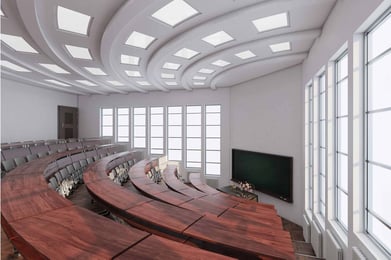 Instead of waiting for that critical system or piece of equipment to break down, include these six areas in your institution’s preventive campus maintenance program.
Instead of waiting for that critical system or piece of equipment to break down, include these six areas in your institution’s preventive campus maintenance program.
As college infrastructures continue to age, institutions need to balance new construction with renovations. According to Gordian’s 2018 State of Facilities in Higher Education, over the last 10 years, the number of buildings that are over 50 years old is increasing. With operating budgets being stagnant, most campuses are finding a growing list of renovation projects and no funding to do the work.
One of the best ways for institutions to preserve existing buildings is to perform preventive campus maintenance (i.e., organized and planned servicing of equipment to ensure systems are functioning properly) in key areas. According to the Guide to Operating and Maintaining EnergySmart Schools, by replacing parts before equipment fails, you can ensure it's running at peak performance.
Here are six areas of campus that should be included in your institution’s preventive maintenance program:
- Cafeterias, student areas, student unions, and labs. These high-traffic areas will need the most attention, and will require ongoing safety, cleaning, and maintenance in order to run smoothly and safety. In labs, for example, make sure tables and fume hoods are in place and in good condition, and that teachers and students have the tools they need for proper disposal of chemicals and other hazardous materials. According to Foodservice Equipment Reports, make sure all food preparation areas are cleaned and disinfected daily. Mechanical and electric components, valve flushing and filter changing should be part of a maintenance routine. How often items should be inspected depends on the equipment, but a custom schedule should be created based on operation use.
- Classrooms. Preventive maintenance is vital in these learning environments. Frequently touched surfaces should be cleaned and disinfected on a daily basis. The classroom environment needs to be comfortable for students as well. According to Buildings, preventive maintenance on heating, ventilation, and air conditioning (HVAC) systems, should include:
- Replacing filters (every 1-6 months)
- Cleaning evaporator and condenser coils (once or twice per year)
- Inspecting fans, bearings and belts (twice per year)
- Looking at the area around the air intake (twice per year)
- Addressing leaks in cabinet and ducts (annually)
- Cleaning and inspect dampers (annually)
- Cleaning ducts every 2 years
- Dormitories, living areas and restrooms. In addition to the basic cleaning associated with these areas, having a preventive maintenance routine helps keep campus buildings running efficiently, including reducing water and energy usage. According to the U.S. General Services Administration, replacing fixtures and installing high-efficiency shower heads, faucet and urinals, and lowering water heater temperature can all play a role in improving water efficiency. Energy usage can be reduced by using occupancy sensors or enlisting light switch “monitors” to turn off lights, turning off fume hoods in laboratories and lowering drinking fountains cooling systems.
- Locker rooms, gyms, and athletic facilities. In these high-traffic areas, it’s important to clean all surfaces that are used often, especially those that come in contact with bare skin. According to the CDC, any shared equipment, including locker rooms and gyms, should be cleaned after each use. Any equipment with damaged surfaces cannot be cleaned properly and should be repaired or thrown away. Make sure to always read the label on an cleaner or disinfectant before applying it to any surface or equipment to make sure it’s safe for that surface.
- Libraries, administrative offices, auditoriums, and theaters. These large, well-used spaces present a great opportunity to save energy due to the amount of lighting and the facilities’ indoor heating/air conditioning consumption. Consider a lighting upgrade for an existing facility and be sure to use the most energy-efficient lighting systems available. According to the Institute for Education Sciences (IES), fire drills should be performed monthly, both to test the fire alarms and practice exiting the building. Inspections of all fire alarms, smoke and heat detectors should be performed during school breaks when buildings are unoccupied.
- Buildings, school grounds, parking lots, and warehouse/storage facilities. The IES says school grounds includes all campus properties—that is all buildings, central offices and administrative or support facilities. All of this property must be maintained regularly and on a preventive basis. This can include courtyards, exterior lighting and signage, pools, and paved surfaces throughout campus. Campus staff should determine how often and what level of maintenance is required for school grounds.
While developing a preventive campus maintenance plan takes time and money, deferring maintenance can push you into a costly and disruptive breakdown/reactive mode. Adopting a preventive maintenance mindset will help ensure your institution’s and student’s success.
The information contained in this article is intended for general information purposes only and is based on information available as of the initial date of publication. No representation is made that the information or references are complete or remain current. This article is not a substitute for review of current applicable government regulations, industry standards, or other standards specific to your business and/or activities and should not be construed as legal advice or opinion. Readers with specific questions should refer to the applicable standards or consult with an attorney.









Leave a Reply
Comment policy: We love comments and appreciate the time that readers spend to share ideas and give feedback. However, all comments are manually moderated and those deemed to be spam or solely promotional will be deleted.